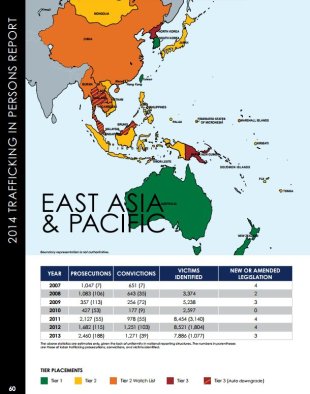The United States government has downgraded Malaysia along with three
other countries – Thailand, The Gambia and Venezuela – to Tier 3 in its
annual Trafficking of Persons (TIP) Report.
Listing out these countries' "broken promises" over several years, the
US said placing these countries on the lowest possible ranking was due
to the lack of insufficient action against human trafficking, CNN
reported today.The TIP report released by the State Department is a gauge of a particular country's response to fighting modern-day slavery.
In a damning statement on the Malaysian government's poor efforts in this regard, the report noted that there is ample evidence of forced labour and sex trafficking in Malaysia.
According to CNN, the report especially highlights Malaysia's problem with migrants from other Asian nations who seek work on farms, factories and construction sites only to be trapped and have their passports taken and wages withheld.
The report ranks governments based on their perceived efforts to acknowledge and combat human trafficking, advance reforms and target resources for prevention, protection and prosecution programmes.
Beyond just a negative perception, a Tier 3 status can also mean less funding for the countries concerned as the US government may use the designation to withhold or withdraw assistance that is unrelated to trade or humanitarian aid, CNN reported.
An even bigger financial implication could be a direct intervention or opposition from the US when it comes to Tier 3 countries seeking development aid from international financial institutions, like the World Bank or International Monetary Fund.
The TIP report said that Malaysia had made "inadequate efforts to improve its flawed victim-protection regime" and h
 ad investigated fewer trafficking cases in 2013 than in 2012. The Malaysian downgrade had been largely expected.
ad investigated fewer trafficking cases in 2013 than in 2012. The Malaysian downgrade had been largely expected.Luis CdeBaca (pic), ambassador-at-large of the Office to Monitor and Combat Trafficking in Persons, cited Malaysia's repeated non-compliance in meeting minimum anti-trafficking standards.
"Malaysia continues to have a victim care regime that basically locks up the victims," Cdebaca told CNN, adding "... the report doesn't look at promises. It looks at results."
According to CNN, four other countries had faced possible downgrades to Tier 3, namely Afghanistan, Barbados, Chad and the Maldives.
However, Cdebaca said each of these countries had demonstrated over the past year that their governments were serious about stopping human trafficking.
"In Afghanistan, for the first time now, we're seeing 14 traffickers being convicted. We're even seeing the conviction of soldiers," CNN quoted Cdebaca as saying.
The TIP report divides nations into three tiers based on their compliance with 11 "minimum standards for the elimination of trafficking".
– Tier 1 countries include governments fully compliant with the minimum standards.
– Tier 2 countries do not fully comply, but are making significant efforts to do so. (A Tier 2 Watch List includes countries with a high number of victims, or where the numbers are significantly increasing. It also includes countries where there is insufficient evidence of acceptable efforts to improve anti-trafficking programmes).
– Tier 3 countries do not fully comply with the minimum standards and have not shown the US they are making significant efforts to do so.
Apart from the three other countries which had been downgraded, Malaysia joins a Tier 3 list of countries which comprises Algeria, Central African Republic, Cuba, Democratic Republic of Congo, Equatorial Guinea, Eritrea, Guinea-Bissau, Iran, Kuwait, Libya, Mauritania, North
 Korea, Papua New Guinea, Russia, Saudi Arabia, Syria, Uzbekistan, Yemen and Zimbabwe.
Korea, Papua New Guinea, Russia, Saudi Arabia, Syria, Uzbekistan, Yemen and Zimbabwe.More than 20 million people worldwide are believed to be ensnared in some form of human trafficking, according to the International Labour Organization.
It was not all negative news on Malaysia in this year's report, however, as the US government paid tribute to the late Irene Fernandez in a Memoriam page under the 2014 TIP Report Heroes section. – June 20, 2014.

No comments:
Post a Comment